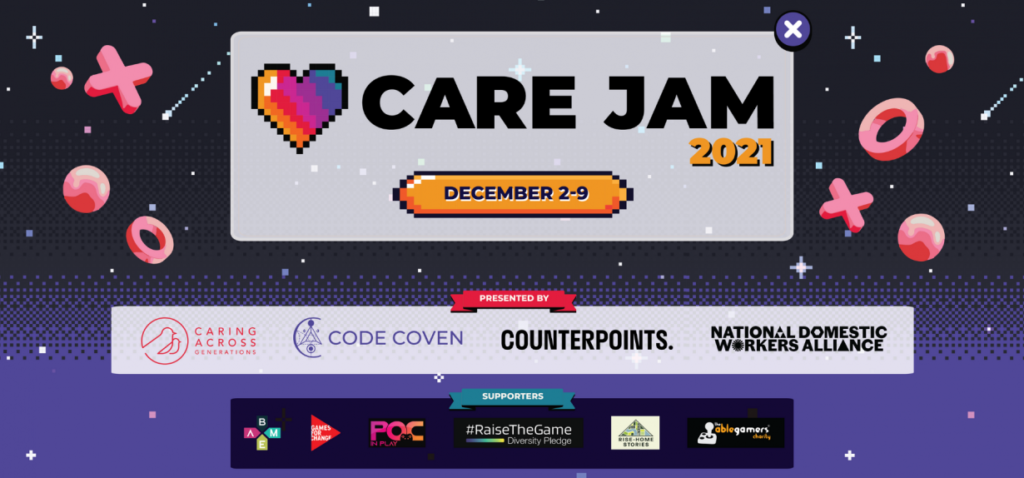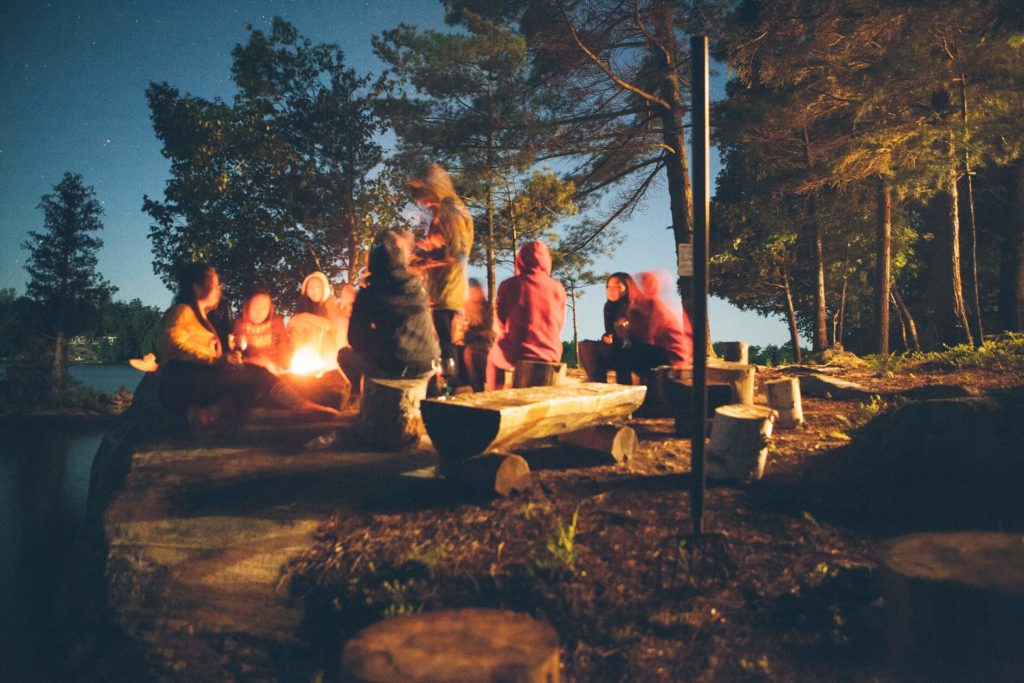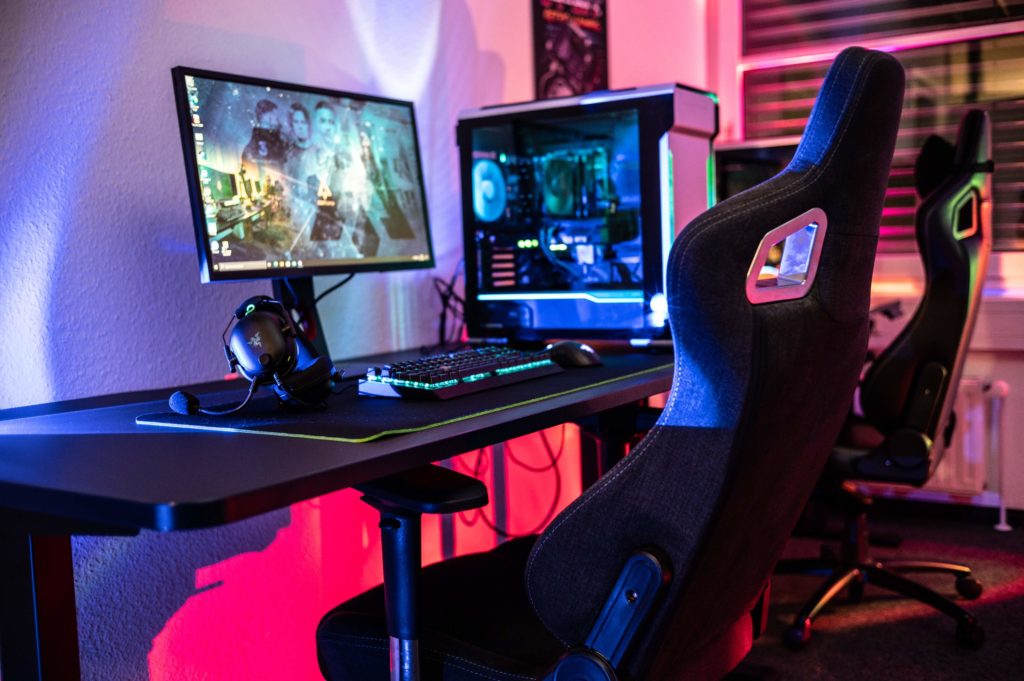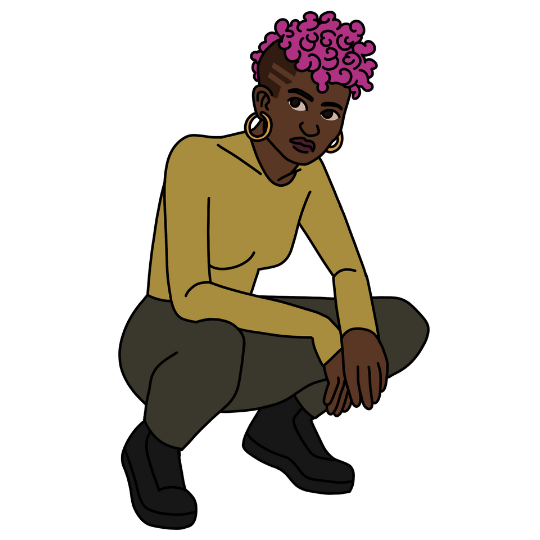Being a Carer in the Video Games Industry
Posted: 18 Mar 2022Working within the games industry can present a number of benefits and challenges that we cover in our day-to-day life, but not many of us have covered what it is like to be a carer whilst working in the games industry. We want to change that.
We spoke to a number of carers within the video games space about what their experiences have been like and how carers can access support within their roles. Their words speak for themselves.
“As a carer for a sister with a learning disability, the main thing I do is probably that I spend considerably more time with my sibling than most people would spend with theirs. My sister shares my passion for videogames, and its basically standard practice at home that once the working day is done that she sets up in my room (where all the gaming tech is) and boots up whatever game she’s currently gripped by (it’s set to be Final Fantasy 14 for the foreseeable future).
Recently I also started driving her around for her various clubs and activities like her training for Special Olympics, which has been a big help to my parents. It affects my work in games in a couple of ways. In my day to day the location from where I work can change to accommodate getting her to where she needs to go, and if we’re both at home for the day I take breaks to check in on her. In a larger sense, I’m very keenly aware of accessibility in games, particularly in the sense of how games teach their players how to play their game.
In my work as a marketer I like to try and keep accessibility in mind and include it in my feedback for clients when we discuss their games.” – Adam Clarke, Game If You Are

“I’m Jon Calvin, Operations Director at indie specialist marketing agency Game If You Are. I’ve been working in the industry for around 7 years, I started out working as a games journalist, freelancing for sites like PC Gamer and Eurogamer, and then transitioned into indie marketing full time around 2017, that’s where I’ve been since. Outside of work, me and my partner act as a full time carer for my daughter, Summer who is 5. She was born with an incredibly rare genetic condition known as Herc 1 Gene Mutation, it is considered a severe intellectual disability and means she is unable to walk, talk or care for herself in any way. It’s so rare in fact, she is the only person in the UK diagnosed with the condition and one of only 6 in the world!
What is it like to be a carer and work in the games industry? My daughter was born just as I was really getting into my full time career in the games industry and thankfully I was lucky enough to work for a very supportive company during that stressful time. It’s hard to imagine how many people cope in a quite demanding industry, it definitely added stress to what was already a challenging position. That challenge can come in many forms, often the working hours can be long in this industry and the jobs highly competitive, that often combines to create an environment in which overtime is considered the norm.

For parents of disabled children like myself, this can cause a lot of undue pressure, and this was certainly something I struggled with breaking into the industry. I have clear boundaries now, but it is very hard to get employers to understand that, saying I have to clock off on time today as my daughter needs me to care for her can be tough, having to refuse weekends as you have to be there for the person you care for can leave you feeling like you’re putting yourself behind others who can do that. That’s hard in a competitive industry where expectations are high. Like many disabled people with complex needs, my daughter also requires lots of hospital visits, this can create difficulties with company’s you work for especially when crunch is not only expected but necessary. I was very fortunate in that I worked for a company that appreciated my individual position, but many people aren’t as fortunate in this industry.
On the positive side, my job was remote from the beginning, as the majority of jobs in games marketing are. For someone who is a carer this makes a huge difference, it means you can be there so much more when you’re needed. It means you don’t have to face lengthy commutes or long days at the office where you have little to no contact with the person you care for. Events can certainly be a challenge though, and I think that is something the games industry could get better at accommodating in general, not just for carers but for parents too. As an experience, it certainly affected my working life in many challenging ways. Games marketing can be quite a stressful job as it is, but carers like myself face a lot of outside concerns, worries and pressures that often go unseen.
The cost of caring for someone full time can be emotionally, physically and financially draining on every level, but it’s a topic rarely raised in any industry, not just games, those who care for others and the unique challenges they face are often forgotten.
I’ve found a lot of resources useful over the years including many local charities in particular. Of course, charities like Safe in Our World and Special Effect offer some great resources, as well as Care Jam run by Code Coven that I took part in this year. I’ve also found Carers UK a helpful resource and personally found a lot of help from the Newlife charity. I also have always found a lot of strength in connecting with other carers in the industry over Twitter or other platforms to discuss and share our experiences, it’s great sometimes to just chat to someone who understands what it’s like.” – Jon Calvin, Game If You Are

“It’s impossible to talk about being both a carer and a creative without it being wholly through the lens of the Covid Lockdown. Working in the care industry has both its benefits and its hindrances and these have all been brought to the forefront when compared to how life was before covid, and how life is for many people around me who were not frontline workers.
For one, I was never worried about keeping my job. I had a steady income all through lockdown, which prevented any financial stress. It also gave me a way to occupy myself, and a way to socialise with the people I support, and my colleagues.

However, caring can be a mentally demanding job, especially when supporting those with complex needs. While it’s usually to delight to interact with these people, having such a massive responsibility for many aspects of their lives (depending on their capacity), can leave you drained by the time you are home. It also doesn’t help that I feel I have both a professional and a personal obligation to be extra careful in regards to covid, even now that the restrictions are being lifted. Some people are extremely vulnerable even when vaccinated, and I can’t imagine how it would feel to accidentally bring it to my workplace. This has a fairly negative effect on my social life, meaning I have been missing out on many gatherings and events. All of this has an on affect creative motivation, especially when you’re only just trying to break out into certain industries.”
Twitter and Discord communities have been a godsend for someone like me. Whilst I have been able to discover places where I can have my reviews published and can promote my charity project, I can also interact with and learn from a seemingly endless stream of interesting people. – Sean Robertson

“My situation is a different kind of heavy since I’ve needed daily support myself with my disability since teenage. I’ve gone through hard depression and agoraphobia periods due to my chronic illness and it’s required a lot from my family. Past years I’ve been a carer for my father and it’s getting more tough with time.
I have my own challenges and being a carer has its own. I’m so happy to be able to take care of dad but I get tired too. I would love to be able to talk with other carers, especially those who work from home. Concentrating on your work is often affected and you need to juggle between feeling selfish and remembering to take care of yourself too. I never needed physical caretaking, nor did my father so far. Let’s hope it stays that way. The emotional side of things can be as hard as the physical. I’d say it can be even harder at times.
Empathy and understanding is here the key – as it is in many life situations. My employers have always been supportive and showed kindness, it’s helped me greatly. I don’t have to hide or make white lies, I can feel safe and comfortable with speaking about the struggles, and my work schedule is sometimes altered accordingly.” – Tarja Porkka-Kontturi
I struggled to re-start my freelance career after the caregiving period finished (it ended with two deaths) and, after a while, I decided to tell the story of that year through a narrative video game (Linda & Joan), which I’ve been working on for the last two years.
Part of the experience of caregiving and grief, for me, was the striking loneliness and lack of resources and, even though my family’s story is unique, the themes are, of course, common to everyone at some point.

So, I guess, I felt some responsibility to share and hopefully provide a resource for others in the future — for those currently going through similar things, or those who are anxious about the future In summary: I think my response at the lack of obvious support was to make something to fill the gap, or at least, one small brick in a gap-filling wall! I’m glad that there are other projects like yours that are also adding bricks. – Russell Quinn
I’d like to thank all those who got in touch to contribute to this article or offer their support. It has been a wonderful learning experience for me in understanding more about what carers face on an every day basis, and how it can affect your mental health – and I hope it’s been the same for you! – Rosie

